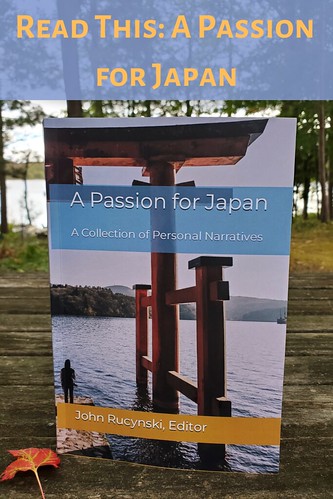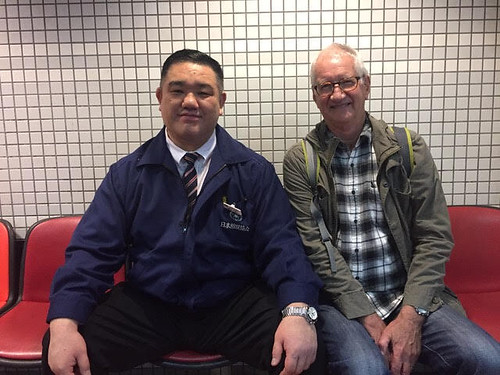Read This: A Passion for Japan
I've got a book for you that will bring you such joy! A Passion for Japan, edited by John Rucynski, is both an ode to building community, and an interesting, in-depth ethnographic look at being a long-term expat resident in Japan. I LOVE it.

Here's why:
Everyone seeks community, which can be difficult, especially now, in a pandemic. How do we build one, find a place, deeply connect? In this book, long-term residents of Japan share their passions (narratives include sports writing, sumo, drumming, writing, tea, gardening, pottery, literature, and more) and how they persevered and connected. It might have taken years, especially in a country where initially cultural circles seem to be closed. As we read in this book, time after time, that is not the case. As with anywhere you live, a joint passion for something can truly connect people across time, space, language, etc., and bring you home.
Oh, Japan! Having lived in Japan, I often felt overwhelmed by my great interests in so many things, and my lack of time to truly learn them all. I took ikebana and tea ceremony classes, attended sporting events, went to bookstores (a little too often), shopped, followed my passion for photography, learned the language...the list goes on and on. I felt that I barely scratched the surface of my new home, let alone forged deep relationships through these experiences. The beauty of this book is that we can explore all kinds of passions through this rich volume of personal storytelling. Each one I read as a standalone, and then thought about it for a bit. The many facets of Japan, as with any culture, show themselves best through personal narratives. I learned much, and was impressed with each ethnography of passion and place.
Most of all, this book opened a window to a world few of us will experience: that of a particular niche in a particular country, by an expat. For people that want to be inspired to work toward community, this book is an important guide. For those that would like to learn more about Japan, crack the book open to any chapter and dig in. It's all there! And for those of us that also love intercultural living and cross-cultural adaptation and growth, this book offers vibrant accounts of people doing just that. Take it with you wherever you go, to dip in, or settle in and devour it, as one does.
Highly, highly recommended.
John Rucynski is a roving American who grew up in New York, Pennsylvania, Georgia, Texas, and Wisconsin. After graduating from the State University of New York at Oswego with a B.A. in creative writing, a “one or two-year adventure in Japan” ended up as an adult life spent almost completely abroad. In addition to calling Japan his home for nearly 20 years, he has also lived in Morocco and New Zealand. He is currently associate professor in the Center for Language Education at Okayama University. His main research interest is the role of humor in foreign language acquisition and intercultural communication. He has edited two volumes on this theme, New Ways in Teaching with Humor (TESOL Press) and (with Caleb Prichard) Bridging the Humor Barrier: Humor Competency Training in English Language Teaching (Rowman & Littlefield). His own passions include world travel, baseball, music, hiking, and cycling.

We were lucky enough to talk with John, and ask him about his new book, inspiration, finding passions and gaining community, and more.
Here's what he had to say...
Please tell us about your new book, A Passion for Japan…
The full title is A Passion for Japan: A Collection of Personal Narratives, and it includes contributions from 31 long-term residents of Japan from 10 different countries. In a nutshell, contributors wrote about a passion that they discovered while living in Japan and how that enhanced their life here or helped them to feel more at home. A wide range of passions are featured in the book, including sumo wrestling, matsuri (festivals), shodō (Japanese calligraphy), literature, and Japanese houses. There’s something for everyone! However, the book is far more than just a “love letter” to Japan. It’s a book about struggles and successes when it comes to living in a foreign country. For many contributors, their respective passion served as a turning point.
This is not an academic book (although readers can certainly learn a lot about Japan!). It is a collection of personal journeys. Contributors were not required to be “experts” about their respective passion. The book is more about how this passion helped contributors to feel part of a community in a foreign land.

Contributor Karen Hill Anton proudly shares her calligraphy works.
What inspired you to write/create this book?
First, as a long-term resident of Japan myself, I have always been intrigued by how my fellow expats manage (or don’t manage!) to fit in and feel at home in Japan. While Japanese language fluency might seem like a necessity, I have discovered that this isn’t always the most important factor. Observing those who seem most comfortable here in Japan, one common feature seemed to be having a respective passion that helped to give them a sense of community. One of my favorite Japanese words is ikigai, which can be roughly translated as “a reason for being” or “why we get up in the morning.” Whether related to your career or just a hobby, having this sense of purpose is a great asset in living comfortably in a foreign country. Additionally, sharing this passion is a great way to connect with others.
Second, despite the boom in English-language books about Japan, I found there to be a lack of anthologies. Personally, I’m a big fan of anthologies, as they provide a wonderful way to discover various subjects and writers in one book. While some long-term residents of Japan, including Karen Hill Anton (who also contributed a chapter to my book!) and Robert Whiting, have recently published memoirs about life in Japan, not everyone is prepared to write a full memoir. A Passion for Japan gave residents of Japan an opportunity to share their fascinating stories in a shorter format.
What might readers be surprised to discover in this book?
That passion can come in so many shapes and forms! Some contributors chose passions directly related to their career, while others chose passions they pursue in their free time. Some contributors wrote about passions that have a long history in Japan (sumo, taiko drumming, tea ceremony), while other contributors wrote about passions that wouldn’t necessarily be associated with Japan (chess, tennis, volleyball).
I wanted to feature different perspectives on similar topics and show the different roles that passion may take in our lives. Take the example of different sports and games. American Tim Craig and Australian Katrina Watts both write about sumo, but whereas Tim is just a huge fan of sumo as a spectator, Katrina actually worked for the sumo association as an interpreter and announcer. Greg Rouault from Canada was able to continue refereeing volleyball matches after moving to Japan, while Simon Bibby from England represented Japan at the Chess Olympiad!

Contributor Tim Craig, a sumo fan since the 1970s, meets stablemaster Nishinoiwa (formerly Wakanosato) at a tournament.
Another pleasant surprise, based on positive feedback I have received from readers so far, is that although the book is called A Passion for Japan, you can also learn a lot about different countries. Respective contributors compare and contrast Japan with their home country. Even as the editor, I learned about topics such as the performing arts in Cameroon, education in India, and life in communist-era Romania.

Growing up in Romania, this book was the “gateway” to Japan for contributor Carmen Săpunaru Tămaș, who contributed a chapter about her love of Japanese festivals.
How did you find such interesting authors to include?
I’ve long had a habit of keeping track of people who have interesting stories to tell, especially within the context of overcoming obstacles or defying stereotypes in a foreign culture. A lot of this goes back to a textbook I created with co-author Alice Gordenker, called Working in Japan, nearly 10 years ago. As an English language teacher in Japan, most of the fellow expats I meet also tend to be language teachers. For this textbook, however, we interviewed a series of non-Japanese people doing a wide range of jobs in Japan, and it opened my eyes to the diversity of foreign residents of Japan.
Although there were a small number of invited contributors, most of the contributors responded to an open call for submissions. This call was shared on a range of social media sites dedicated to life in Japan. I honestly feared whether I would get enough potential contributors for a whole book, but I was blown away by the response–both by the large number of people interested in contributing and the diverse range of passions. Although every chapter is about Japan, readers can discover a great number of different worlds.
What do you think are broader implications, globally, for finding passions and gaining community?
While A Passion for Japan looks at community from a cross-cultural perspective, I believe that finding your passion (or passions!) and gaining community are integral parts of a happy life regardless of where you live. “Think globally, act locally” is still a wise mantra to live by. With social media, we have unprecedented access to communicating with people in all parts of the world. But we still need to belong to a local community. As a baseball fan, I’m thrilled that I can now follow my Boston Red Sox so easily online. But it’s only when I go to an actual baseball game at my local ballpark, Koshien Stadium (home of the Hanshin Tigers), that I feel part of a community.

Everyone feels like a part of the local community at Koshien Stadium. (photo by Trevor Raichura, who contributed a chapter about his love of the Hanshin Tigers).
I am not one to discount the potential of social media. It has enormous potential–when used in the right way. But we also need to remember to communicate actively and kindly with the people in our immediate physical environment. And I think this goes back to what I respect about all the contributors to A Passion for Japan. Most of them surely struggled to adapt to life here in Japan, but in the end they said, “This is where I am and I’m going to make the most of it.” And by having that attitude, they eventually made Japan not just where they live, but their home. Through their stories, we can see the importance of passion and community.
How can people find your work?
Amazon book link: https://www.amazon.com/Passion-Japan-Collection-Personal-Narratives/dp/4991150736
Publisher book link: https://blueskyacademic.net/bluesky-publishing/a-passion-for-japan/
Researchgate: https://www.researchgate.net/profile/John-Rucynski
Facebook: https://www.facebook.com/john.rucynski/ and https://www.facebook.com/groups/433875752018367
Instagram: https://www.instagram.com/a_passion_for_japan/
Pecha kucha presentations: https://www.pechakucha.com/users/johnrucynski
Goodreads: https://www.goodreads.com/author/show/21677181.John_Rucynski_Jr_
Is there anything else you'd like to share?
First, I hope people realize that this is not just a book for Japanophiles! It is about Japan, but it is also about more general themes such as overcoming obstacles when living in a foreign country and finding your passion. Whether you actually live in Japan or have only a marginal interest in Japanese culture, I strongly believe that the book will appeal to a broad range of readers.
Second, please do reach out to me if you have your own passion for Japan to share. I am keeping the door open for a second volume. Or, if you just want to share how you were inspired by the stories, I’d love to hear about it!
-

- Log in to post comments




















